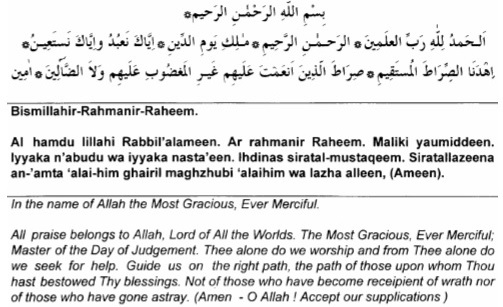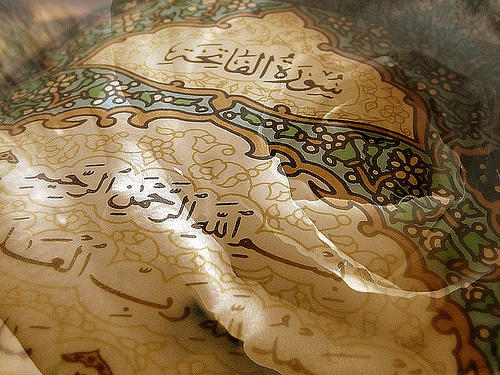The very first Chapter of the Holy Qur’an is called Surah Al-Fatihah. It is sometimes called the ‘Mother of the Book’ because the rest of the Holy Qur’an is, in fact, a commentary on this chapter in which God teaches man to pray to Him for guidance on the right path. It is a wonderful comprehensive prayer which the student should learn and use in their prayers.
The prayer is as follows:-

A deeper study of this short chapter reveals the beauty which lies in the wonderful relationship between the attributes of God and the prayers. The attributes mentioned in the first part of this chapter are in order:
1. All praise belongs to Allah, the Creator, the Sustainer and Developer of the worlds.
2. The Gracious
3. The Merciful, Giver of the best rewards
4. Master of the Day of Judgement
Corresponding to them we have the prayers which follow:
1. Thee alone do we worship and Thee alone do we implore for help.
2. Guide us on the straight path.
3. The path of those on whom Thou hast bestowed Thy favours.
4. Those who have not incurred Thy displeasure and those who have not gone astray.
The best-known title of this short Surah i.e. Fatihat al-Kitab, (Opening Chapter of the Book) is reported on the authority of several reliable traditionists (Tirmidhi & Muslim). The title was later abbreviated into Surah Al-Fatihah, or simply Al-Fatihah. The Surah is known by quite a number of names, the following ten are more authentic:-
Al-Fatihah, Al-Salat, Al-Hamd, Umm al-Qur’an, Al-Qur’an al-Azeem, Al-Sab al-Mathani, Umm al-Kitab, Al-Shifa, Al-Ruqyah and Al-Kanz.
These names throw a flood of light upon the extensive import of the Surah.
- The name Fatihat al-Kitab (Opening Chapter of the Book) signifies that the Surah having been placed in the beginning serves as a key to the whole subject-matter of the Qur’an.
- Al-Salat (The Prayer) signifies that it forms a complete and perfect prayer and constitutes an integral part of the institutional Prayer of Islam.
- Al-Hamd (The Praise) signifies that the Surah brings to light the lofty purpose of man’s creation and teaches that the relation of God to man is one of grace and mercy.
- Umm al-Qur’an (Mother of the Qur’an) signifies that the Surah forms an epitome of the whole of the Qur’an, containing in a nutshell all the knowledge that has a bearing on man’s moral and spiritual development.
- Al-Qur’an al-Azeem (The Great Qur’an) signifies that although the Surah is known as Umm al-Kitab and Umm al Qur’an, it nevertheless forms part of the Holy Book and is not separate from it, as mistakenly considered by some.
- Al Sab al-Mathani (The Oft-repeated Seven Verses) signifies that the seven short verses of the Chapter virtually fulfil all the spiritual needs of man. It also signifies that the Chapter must be repeated in every Raka’at of Prayer.
- Umm al-Kitab (Mother of the Book) signifies that the prayer contained in the Chapter was the cause of the revelation of the Qur’anic Dispensation.
- Al-Shifa (The Cure) signifies that it provides remedy for all the legitimate doubts and misgivings of man.
- Al-Ruqyah (The Charm) signifies that it is not only a prayer to ward off disease, but also provides protection against Satan and his followers, and strengthens the heart of man against them.
- Al-Kanz (The Treasure) signifies that the Surah is an inexhaustible store-house of knowledge.
The Surah forms as it were, an introduction to the Qur’an. It is, in fact, the Qur’an in miniature. Thus at the very beginning of his study, the reader becomes familiar in broad outline with the subjects he should expect to find in the Holy Book. The Holy Prophet (s.a.w) is reported to have said that:
‘Surah Fatihah is the most important Chapter of the Qur’an.’ (Bukhari).

